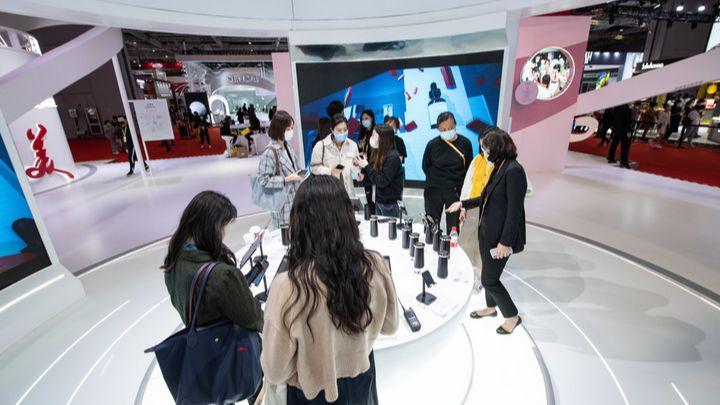JINAN, Nov. 13 (Xinhua) -- Chinese beauty brands have shone during this year's "Double 11" shopping festival as more consumers embrace their products that blend traditional aesthetics with cutting-edge scientific research.
From established names like Proya, Winona and Chando to niche emerging brands, many offer sought-after products and rank among the top sellers on major e-commerce platforms.
Proya topped the beauty product sales on Alibaba's Tmall platform during the "Double 11" shopping promotions, which ran from Oct. 15 to Nov. 11. More domestic brands also made it into the top 20 this year.
Industry data from ENDATA shows that most consumers of domestic cosmetic products are between the ages of 18 and 44, with women under 30 being the core consumer group. With strong cultural literacy and an eye for design, these consumers have been drawn to Chinese aesthetics -- product designs and brand philosophies rooted in traditional Chinese culture, combining history with modernity.
"The growing popularity of Chinese cosmetics stems from cultural confidence rather than marketing alone," said Gao Chunming, president of the Shandong Cosmetics Industry Association. "Since younger generations prefer brands with a Chinese cultural identity, local brands are responding by integrating oriental aesthetics into their products."
"Our brand name, 'Lian,' originates from the traditional lotus culture," said Jiang Liangyan, the brand manager of Yilian, which has sold more than 1 million items during the online shopping festival. "We even draw on traditional aesthetics such as Song Dynasty (960-1279) ceramics to develop our gift boxes."
Searches on major e-commerce platforms have revealed that traditional cultural elements, including Chinese flowers, blue and white porcelain, and landscape painting, have become popular in product and packaging designs, and they have strong appeal among young consumers.
But culture is not the only consumption driver. A growing number of ingredient-centric and efficacy-driven consumers now prioritize product safety and efficacy over low prices.
"For Chinese cosmetics brands to succeed, they must combine storytelling with scientific research and proven efficacy," Gao said. "Only genuine breakthroughs in core technology can win lasting consumer trust."
Using a globally pioneering enzyme-cutting technology, Bloomage Biotech produces hyaluronic acid (HA) of different molecular weights used by leading global brands, said Shi Yanli, a materials scientist for the company.
A report from U.S. consulting firm Frost & Sullivan has shown that China accounted for more than 84 percent of global hyaluronic acid sales in 2023.
"China's distinctive plant resources are a treasure trove with tremendous industrial potential," said Du Hong, secretary general of the Guangdong Cosmetics Quality Management Association. "As consumers increasingly pursue natural and green products, plant-based cosmetics are expected to become new drivers of industry growth."
Facial mask brand Mask Family has developed products using ingredients from over a dozen traditional medicinal plants, including camellia seeds and white truffles. "We hold more than 50 core patents," said Huang Xiaodong, the company's founder and chairman.
Lin Tong, a 23-year-old university student in Jinan, capital of east China's Shandong Province, is a fan of domestic cosmetic products with plant-based ingredients. "They work really well and I feel completely assured using them," Lin said.
And the appeal is spreading abroad. According to China's General Administration of Customs, cosmetics exports rose 11.7 percent year on year to 36.68 billion yuan (about 5.2 billion U.S. dollars) in the first eight months of 2025, marking a third consecutive year of double-digit growth.
"Our products are adjusted in accordance with local preferences, and we also collaborate with local influencers on livestreaming e-commerce sales," said Cui Hui, public relations manager at cosmetics company Meishang.
Thanks to localized operations, various products from Meishang sub-brand Colorkey have become popular among consumers in Southeast Asian countries like Vietnam, Malaysia and Indonesia.
At the 35th International Federation of Societies of Cosmetic Chemists Congress held in September in Cannes, France, several Chinese cosmetics companies were invited to deliver reports on their research findings, including microbiome skincare findings from Dr. Alva, a sub-brand of Freda.
"Our team unveiled two new research breakthroughs in microbiome skincare, which drew considerable attention," said Yuan Chunying, a research and development engineer at Dr. Alva.
"Chinese enterprises should learn from global leaders in research and development to develop more high-quality, consumer-focused products," Yuan noted.




 A single purchase
A single purchase









